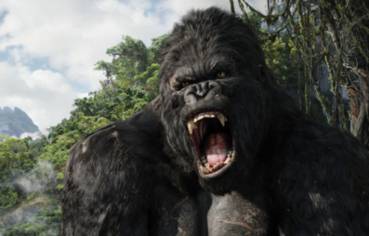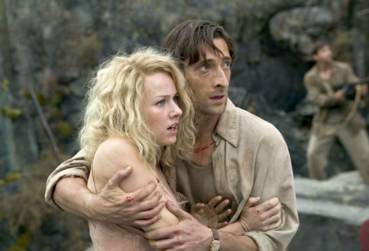"What a piece of work is man! How noble in reason!
how infinite in faculties! in form and moving,
how express and admirable! in action how like an angel!
in apprehension, how like a god!
the beauty of the world! the paragon of animals!" |
Hamlet Act II Scene II |
"T'was
beauty killed the beast..." says Carl Denham, fictional
movie-within-a-movie director. In 1933, you almost believed
him. In 2005? Uh no, actually. Oh, it fair makes the comedy
steam shoot from one's ears. That self serving, arrogant
bastard makes such a pronouncement staring at the dead,
broken Kong at the foot of the Empire State building when
it was Denham's greed and ambition that brought the wondrous
animal down. Driven director Denham got so many people killed
due to his bottomless ego, as well as ending the life of
the titular noble savage, it makes me want to La Motta a
brick wall. Take a breath. Of course. That's the point.
In both 1933 and 2005 versions, we come off very badly as
mankind in general. But whereas the pro-nature message in
1933 was preceded by one hundred minutes of what was seen
then as almost 'realistic' special effects, it didn't seem
heavy handed despite the size of Kong's fist. Jackson's Kong is over three hours long. And director
Denham in the 30s was played a little more lightly by Robert
Armstrong than Jack Black's seedy and wholly (to me, I stress)
dislikeable (and perhaps 21st century ironic) interpretation.
Unfair to compare movies made and performances given 72
years apart but there we are. I'm an unfair bastard but
they are both called King Kong...

Jackson's
film so sturdily and unabashedly makes almost all the human
beings in his vast, unrelenting remake of a classic B movie
completely disreputable that this massive enterprise groans
at the strain of its 'nature is good, mankind is palpably
crap' subtext. Its B movie foundations are not strong enough
to support a 'state of the art' enhanced A movie. In making
Kong so noble, all interest in anyone else (with the exception
of two very well judged performances, one human, one simian,
those of Naomi Watts' Ann and Andy Serkis' Kong) is predicated
by the response to a simple question "Does this character
want to profit from Kong's imprisonment?" If the answer
is yes (and it is in so many cases) then we (mea culpa,
I, not 'we') dislike them and disliking a lot of principal
characters is not likely to adhere you to the whole shebang.
The entire first half of set up dealt mostly with characters
I nary gave an ape pooh about. How does that set up a condition
of empathy? Even the human hero, Adrien Brody as the caged
writer Jack Driscoll, is hampered by his inevitable competition.
Its clear he's not going to win any arm wrestling competitions
against his rival. This said, the first half of the film
is gorgeous. 30s New York is digitally recreated with as
much care and love as you could wish for. It's eye candy
sure enough but more about that particular confection later.
There was an intermission in the screening I attended and
half of my Kong party said they were looking
forward to what happened next. The other half was stupefied
by 'not caring' so far. I have to admit I was with the latter
camp. Jackson said he needed that hour of exposition at
the start so that we would feel something when characters
are picked off one by one in dino stampedes, bug attacks
and Kong caber tossing. I think the movie should have started
on the boat as soon as it could. I didn't give two hoots
for Carl Denham (whose ego the whole film is a victim to)
and although Jackson got Ann and Kong so, so right, it was
like watching a diamond trailed through mud. It still shone
brightly, sometimes too brightly but there was so much mud.
Way
back when he was 18 inches tall, made of metal, rubber and
rabbit fur with a supporting limb of a very large animatronic
arm - and also when no one knew anything about gorillas
- King Kong was a modest 100 minute "Isn't the human
race just about as corrupt, selfish and destructive and
odious as we feared." OK, I can go with that. It's
rightly a classic for its timeless story as well as its
special effects that stand up to today's fur-rendered-realistically-CG
as well as wooden tennis racquetted Fred Perry would against
graphite wielding Pete Sampras. Times change. Fred Perry
gets his ass kicked (however endearing his style of play
was).
What
Jackson was setting out to do with King Kong (I suspect) was to give back that 'Wow!' factor to today's
cinema-going youth, to offer the same spell under which
he fell watching the original. But it's 2005 and Jackson
himself has already produced nine (if we include the extended
DVD versions, twelve) hours of a movie trilogy that made
almost everyone on the planet go 'Wow!' How much of that
was Tolkein and how much was Jackson is a moot point open
for some debate but without Jackson's good judgement, vast
directorial scope and vision (let's be honest here, his
direction of Lord Of The Rings is quite
superb) Tolkein's classic could still have never taken off.
Just think what the movies would be with all the poems and
songs intact. Fans complained about the excision of the
jolly Tom Bombadill from Fellowship of the Ring.
Do you think it would have made 650 million dollars worldwide
if we had to endure tripe like this?
"Hey dol! merry dol! ring a dong dillo!
Ring a dong! hop along! fal lal the willow!
Tom Bom, jolly Tom, Tom Bombadillo!"
Someone get me a pillow.
Tolkein
was a masterful storyteller but his poems were higher than
the ripest cheese. Jackson is no fool and very much plugged
in to 21st century audience expectation and desire despite
his own desires to bring a book, written in the early 50s,
to vivid life (true, Rings is hardly dateable).
Tom Bombadill was out. His next project, a remake of a 30s
movie that knocked everyone's socks off then, knocks one's
socks off today too but to me, only a wide eyed 'Wow!' at
extraordinary eye candy, not a profound sense of being moved
as the original allowed me (and presumably Peter Jackson).
The eye candy on display here is jaw dropping (more of that
in a minute) and literally jaw breaking but then candy was
never nourishing (not jaw working). Despite the wonders
on the screen, I was starving for real nourishment.

All
movies have their internal logic - they have to adhere to
some element of boundary or the audience disengages. Sometimes
those rules can come as a compete surprise and delight you
at their revelation - The Dark Crystal:
our diminutive boy and girl heroes, the last of their kind,
the Gelflings, are herded over a cliff and they are going
to die because gravity has been established in this world.
The female suddenly sprouts wings and the male, holding
on to her says "Wings? I don't have wings." "Of
course not," the female says. "You're a boy!"
I can still feel my initial delight at that line. Sometimes
the rules change halfway through a movie - From
Dusk Til Dawn changed genres halfway through and
that was quite a coup. Sometimes the rules are just stretched
and stretched and sometime throughout the mid nineties those
stretched rules broke. This is what Jackson is having to
take into hefty consideration with Kong.
As the action ante is upped, so is human resilience and
semi-invulnerability to match it. We have leapt from employing
the suspension of disbelief to the barricading out from
a fortress with big two by fours, keeping the disbelief
monster out. Sorry. Mine keeps tearing up the drawbridge.
It's
been suggested by a good friend that how can there be any
rules once the fog arrives and the compass starts spinning?
Well my answer is that people are still people, flesh and
blood (unless we are informed otherwise) and if a person
drops from a small height, they will sprain ligaments. Dropping
from a higher height, they will break bones. Above that,
it's "Adiós, muchachos." Action movies
have stretched the limits of action hero pain and death
threshold culminating with Bruce Willis and Samuel L. Jackson
both dropping forty feet off a bridge on their backs onto
a metal container in Die Hard With A Vengeance and just groaning as they roll off unhurt. No. They are
flesh and blood, they are dead, they are very, very dead.
Their spines are historical Hollywood relics.
Ann is sacrificed by the scary tribes of Skull Island (a
marvelously designed enormous decay ravaged upside down
tooth thrust from the ocean) and taken deep into the jungle
by Kong, curious at his new toy. Jackson goes to great trouble
showing us Ann's POV whilst in Kong's clutches. This is
OK except that 'realistically' (if such a word exists on
Skull Island) Ann would be, at best, puking up for three
hours after this massive primal assault on her equilibrium
or at worst (and most likely) she'd be dead. OK, we forgive
lapses (we'd forgive them more if the implausibility wasn't
so cinematically pronounced) and start to delight in the
relationship. Kong is as real is a twenty-five foot tall
silverback could be. I sincerely think (a big nod to WETA
and Jackson's obvious drive for photorealism) that if a
twenty-five foot silverback existed, it would look no different
to Kong. Perhaps it would need a few more takes to complete
a performance... Kong in King Kong is a true wonder to behold.
Computer
Generated Imagery has climbed to a new plateau. Despite
its critics (for I am one), the technology displayed here
takes the breath away. Serkis did the research and so Kong
is an utterly believable Rwandan Silverback Gorilla. And
that's great if it weren't for the fact that the movie has
to deal with the humans too. So what do you do if you are
a world famous and award winning director to give your latest
B Movie remake some weight? Well, you could abandon all
pretensions and just let rip with Kong et al on Skull Island
(side note, the insects were wonderfully realised and in
answer to the same repeated question, yes there were dinos
in the original) or you can do this and also inject some
meaning via other veins of thought. Slipped in almost surreptitiously
are references to Conrad's Heart Of Darkness.
A
noble ship's mate has read Conrad's book and so encourages
a young man who became part of the crew to devour the literature.
Whether we are supposed to think that the whole movie is
director Denham's (Marlow in the novella) tale about Kurtz's
ivory trading in the Congo (who would that be, Kong, Denham's
own black soul?) is moot to the point of being not moot
at all. It's the embedding of profundity where none belongs.
It's King Kong not Apocalypse Now.
Coppola's 1979 masterpiece could encourage ten thousand
articles on its meaning (based loosely, of course, on Conrad's Hearts Of Darkness). King Kong elicits, perhaps four.
Regardless
of these (some may say) petty criticisms, the movie is firing
whenever Kong and Ann are on screen. I adored the ice skating
scene and Kong's death (hardly a spoiler) was protracted
a little too much. So if you want not to believe your eyes,
then go and wonder at the eighth wonder of the world. But
be aware you have about an hour of ineffective character
building before you get to see him.
|